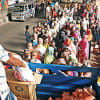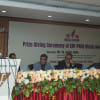Navigating through rough waters

2023 is already here and no doubt, the last three years have been rough for Bangladesh. It is almost as though a ship at sea navigating and making its way through rough waters during a storm.
The so-called storm has manifested in the form of the pandemic-triggered economic slowdown, sanctions resulting from the Russia-Ukraine war, too much pressure on forex reserves leading to a negative balance of payments; various supply chain crises, and finally, the ongoing high inflation that has unfavourably changed consumer spending patterns across the globe, directly impacting Bangladeshi businesses and industries in numerous negative ways.
Such shifts in global economic dynamics have adversely impacted all stakeholders, ultimately leading to higher levels of poverty.
Whether such adversities may be short-term or if they continue to pinch us in the long term, certain changes and actions will be needed for Bangladesh, especially considering its upcoming LDC graduation. Additionally, income equality will continue to pose as a significant impediment to true development even in the long run. Climate change also poses a major threat to Bangladesh since it ranked seventh in the Global Climate Risk Index 2021.
As always, with challenges also come opportunities and for Bangladesh, there is a significant opportunity for substantial improvement, especially in foreign direct investment (FDI), which has been very low compared to what could be achieved if the right reforms are made. In fact, considering the economic and population size of Bangladesh, inducing a much greater FDI to GDP ratio should be a priority.
Despite the roadblocks, Bangladesh still boasts a growing middle-income population and a continued high overall GDP growth rate. This, combined with almost half of the population deemed as "young" and technologically adaptable, also provides room for massive expansion and growth in the information technology sector.
As a result of rapidly evolving technology and automation, a concern is that many kinds of jobs that are currently done by labour may soon become obsolete and uncompetitive.
Hence, the only strategic option for Bangladesh is to be ahead of the technological disruptions by constantly focusing on upskilling and educating its workforce in the latest innovations because almost everything starting from industrial processes and data management to energy consumption, financial services and agricultural techniques are changing very quickly. We need to be much more agile and adaptable as a nation.
While there are certainly many opportunities for Bangladesh, certain aspects need to be considered and a well-planned out approach must be taken. Reforms in the regulatory framework and financial sector, political stability, intelligent management of the geopolitical map and improved business environment appear to warrant the highest attention for contending with the existing complexities.
Sustainable development rarely happens separately. Rather, it requires systematic and synergetic cooperation, coordination, and partnerships between the public and private sectors. Public policy and regulations can't contradict economic and business growth aspirations.
Not just Bangladesh but the entire world is also navigating through a challenging time and therefore when we envisage our combined future, we can't just look at our own growth, but we should also try to have an inclusive mindset.
We should embrace equitable growth that considers the positive outcomes on our shared society and environment. Having sustainability at the core of all future business, regulatory, policy and growth endeavours while also reducing costs will not only lead to even greater revenues and profits but will also create a better image of Bangladesh in the world.
The author is an economic analyst.

 For all latest news, follow The Daily Star's Google News channel.
For all latest news, follow The Daily Star's Google News channel. 








Comments